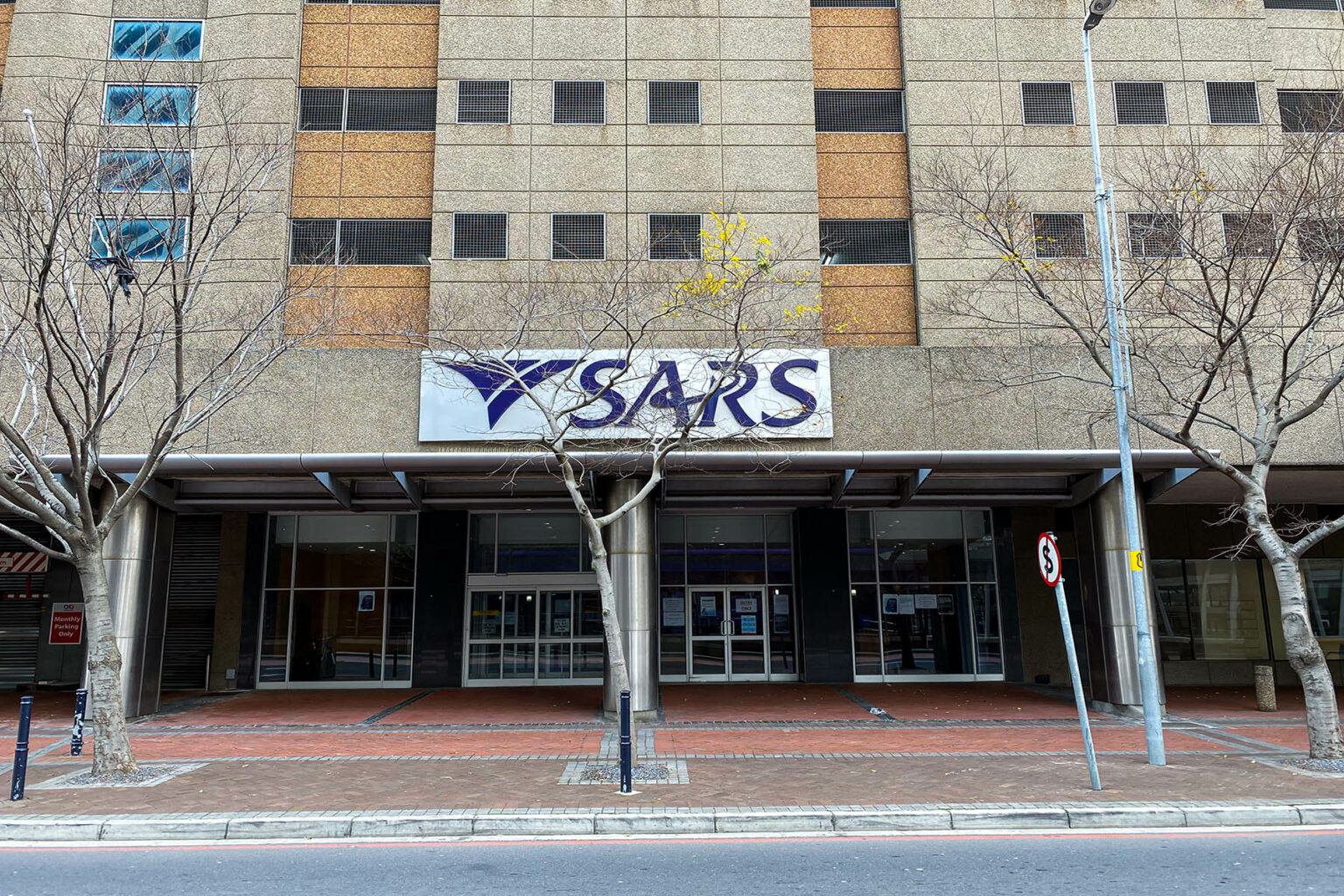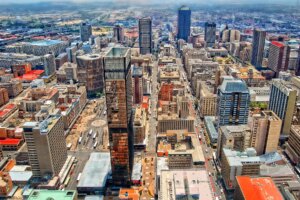The South African Revenue Service (SARS) manages the national tax system. It levies several types of taxes, such as income tax for individuals and businesses, customs duties on goods imported into the country, and a value-added tax (VAT) on purchases. The revenue helps the government pay for public services and maintain the country’s infrastructure.
The system is designed to be fair, based on a progressive scale; the more you earn, the higher your tax bracket.
Find out more by exploring these topics:
- The tax system in South Africa
- Who pays tax in South Africa?
- Do I need a tax ID number in South Africa?
- Tax on pensions in South Africa
- Types of taxes in South Africa
- Personal income tax (PIT) in South Africa
- Corporate income tax (CIT) in South Africa
- Value-added tax (VAT) in South Africa
- Turnover tax in South Africa
- Import and export taxes in South Africa
- Property rates in South Africa
- Transfer duty (property tax) in South Africa
- Estate duty (inheritance tax) in South Africa
- Donations (gift) tax in South Africa
- Payroll taxes in South Africa
- Road taxes in South Africa
- Air passenger tax (APT) in South Africa
- Environmental taxes in South Africa
- Withholding tax on royalties and interest
- Other taxes
- Tax avoidance and evasion in South Africa
- Tax advice in South Africa
- Useful resources
The tax system in South Africa
The South African Revenue Service (SARS) is the government authority overseeing all tax affairs, including policies, regulations, collection, and fraud investigations.
The tax year in South Africa begins on 1 March and ends on 28 or 29 February of the following year. Individual taxpayers use this period to determine when to file their income tax returns.

South Africa has one of the highest personal income tax rates (PIT) in Africa, at 45%, compared to its neighbors, such as Namibia (37%), Botswana (25%), Zimbabwe (41.2%), and Mozambique (32%). However, globally, it is still lower than countries like Austria (55%), Netherlands (49.50%), Spain (47%), and the United States (37%) but similar to the UK (45%).
What is new about taxes in 2024?
According to the National Budget Speech (2024), there are some important developments and changes to note, including:
- Significant changes to the Income Tax Return for Companies (ITR14) and Notice of Assessment for Companies (ITA34C) forms from 23 June 2023
- From 15 September 2023, SARS implemented a new air passenger tax (APS) system via eFiling and issued new APS numbers to operators
- Changes in the amounts of allowances (i.e., rate per kilometer and subsistence allowances)
- Amendments to PAYE Employer Reconciliation BRS for the 2025 tax year, including:
- New source code (3926) for the Withdrawal from a Retirement Fund from the Savings Component/Pot
- Changes to descriptions and validation rules for
- Unclaimed benefits (source code 3909)
- Certificate Number (source code 3010)
- Directive Number (source code 3230)
- Directive Income Source Code (source code 3232)
- Transfer of Unclaimed Benefits (source code 3923)
- NED Directors/Audit Committee Member Fees (source code 3620/3670)
Individual taxpayers who have purchased solar panels can apply for solar energy tax credits when filing the IRP6 return. However, the credits are only applicable for the tax period from 1 March 2023 to 29 February 2024. They cover the cost of solar panels but not inverters, batteries, or supporting structures. This is a government incentive to encourage more people to invest in renewable energy.
Who pays tax in South Africa?
You are a tax resident if you consider the country your main place of residence (i.e., an ordinarily resident) or if you meet the three physical presence test criteria – you lived in South Africa for:
- 91 days in total during the year of assessment
- 91 days in total during each of the five years of assessment preceding the tax period
- 915 days in total during those five preceding years of assessment
You must pay income tax to SARS if you earn any remuneration above the exemption threshold, which is:
- Younger than 65: R95,750
- Aged 65 to 75: R148,217
- Older than 75: R165,689
If you are a permanent resident or citizen, you will be taxed on your worldwide earnings. The exemption threshold for foreign employment income is R1.25 million, meaning that foreign remuneration above this amount is subject to South African tax levies.
You are considered a non-resident for tax purposes if:
- You are not an ordinarily resident
- You do not meet the physical presence test criteria
- You’ve been outside of South Africa for at least 300 days continuously
If you qualify as a tax resident under South African law, you must register as a taxpayer with SARS. You can do this in person at a local SARS branch, but it is easier to do it online via the eFiling portal.
How does tax work for expats?
Foreign residents pay the same income tax as South African citizens and permanent residents. However, taxes for non-resident taxpayers only apply to income from South Africa and not worldwide (i.e., double taxation treaties.)
SARS has implemented this policy to ensure that individuals moving from one country to another are not taxed twice on income earned in their home country.
Therefore, South Africa has tax treaties with many countries worldwide to eliminate double taxation. SARS categorizes the Double Taxation Agreements (DTAs) and Protocols into two groups:
However, since 1 March 2020, foreign employment income earned by a resident exceeding R1.25 million has been taxed in South Africa according to the tax tables for that year. This applies to residents who spend more than 183 days, including at least 60 consecutive days, outside of South Africa within any 12-month period during the assessment year.
Do I need a tax ID number in South Africa?
You must register with SARS if you are liable for taxes. If you work for a company or organization, your employer will do this for you. Otherwise, you will receive a tax reference number when you register with SARS eFiling. You can use this number for activities such as paying taxes and claiming benefits.
Businesses must also register for taxes including VAT. Once your company has signed up with the Company and Intellectual Property Commission (CIPC), you can register with SARS for a business income tax number. Some companies must also apply for a VAT number.
Tax on pensions in South Africa
Receiving income from international retirement funds is not taxed. However, local pensions are subject to tax at various rates, depending on whether the payment is received as a lump sum or an annuity.
Transferring an international pension scheme to and from South Africa is complex and can have significant financial costs. Therefore, consult a tax advisor who has expert knowledge about pension schemes globally. For example, South Africa no longer holds a Qualifying Recognized Overseas Pension Scheme (QROPS) status (used to transfer a UK pension simply).
One alternative when moving pension funds abroad may be to explore an International Pension Plan (IPP) like the 40EE scheme.
South Africa subscribes to Automatic Exchange of Information (AEOI) standards, which include FATCA (Foreign Account Tax Compliance Act) and the CRS (Common Reporting Standard). AEOI allows global tax authorities to regularly share information about taxpayers to help ensure everyone follows tax rules internationally.
South African financial institutions are required to identify accounts held by foreign tax residents and report this information to the South African Revenue Service (SARS), which then exchanges the information with partner tax authorities.
Types of taxes in South Africa
SARS encompasses several types of taxation, including:
- Personal income tax (PIT), including capital gains tax (CGT) and provisional tax
- Corporate income tax (CIT), including dividends and security transfer tax
- Value-added tax (VAT)
- Turnover tax
- Import and export taxes
- Municipal property rates
- Transfer duty
- Estate duty
- Road taxes, including fuel and road accident fund levies
- Air passenger tax (APT)
- Environmental taxes, including carbon tax (CBT)
- Withholding tax on royalties and interest
- Additional levies and duties (e.g., diamond export levy)
Personal income tax (PIT) in South Africa
If you receive remuneration in South Africa, regardless of your residency status, you’re required to pay income tax annually, specifically if you earn above the tax thresholds.
Your tax bracket is determined by your net earnings after deductions and increases progressively from 0% to 45%.
You would also be required to file an annual income tax return at the end of the tax year if:
- You have multiple income streams
- You earn more than R500,00 per year
- You claim additional allowable tax-related deductions
- You claim tax rebates or refunds
- You are self-employed
Again, the tax year runs from 1 March to 28 or 29 February.
The government uses the revenue from income and other taxes (e.g., corporate, VAT, property, customs, and excise duties) to fund the social security system and public services such as education, healthcare, and policing.
Provisional tax for self-employed workers
Self-employed individuals (e.g., sole proprietors, independent contractors, and freelancers) who earn income through business activities, projects, contracts, consulting, or other independent ventures are responsible for paying income tax on their earnings if they exceed the tax thresholds.
These brackets differ slightly from PIT thresholds and also depend on age:
- Younger than 65: R91,250
- 65 to 74: R141,250
- 75 and older: R157,900

Freelancers are categorized as provisional taxpayers and need to complete the IRP6 return online via eFiling.
Provisional tax enables taxpayers to prepay their income tax throughout the assessment year, helping to avoid a large financial burden upon assessment. Taxpayers make at least two estimated payments during the year and may opt for a third payment before the tax year ends, with these payments offsetting their final tax liability upon assessment by SARS.
For example, the deadlines for the 2024 tax year are:
- First payment: Las business day of August 2024
- Second payment: Last business day of February 2025
- Third payment: Voluntary; last business day of September 2025
As a provisional taxpayer, you can deduct various business expenses related to your work. These can include costs such as vehicle expenses, rent, electricity, stationery, and more, provided they are necessary for the operation of the business and are incurred in the production of income. Maintaining thorough records and documentation to support all claims for these deductions is essential.
Capital gains tax (CGT)
Capital gains tax (CGT) is a component of income tax and is imposed on the proceeds from the sale of any asset.
Residents must pay CGT on local and international assets.
Conversely, non-residents are only subject to CGT when they sell immovable property situated in South Africa or assets of a permanent establishment in the country. This encompasses various assets such as immovable property, certain shares in companies primarily deriving their value from South African immovable property, and business assets of a permanent establishment in the country.
Corporate income tax (CIT) in South Africa
Corporate income tax (CIT) is payable on business income for all companies registered in South Africa. This includes:
- Listed and unlisted public companies
- Private companies
- Close corporations
- Cooperatives
- Collective investment schemes
- Small businesses
- Share block companies
- Corporate bodies
- Public benefit companies
- Dormant companies
In South Africa, SARS has set the corporate income tax rate for the fiscal years ending after 31 March 2023 at 27%, a decrease from the previous 28%.
Small business corporations (SBC) enjoy a differentiated tax rate based on their taxable income, starting at 0% for the first R95,750 and scaling up to 27% for taxable income exceeding R550,000.
This tiered structure aims to support SBCs by reducing their tax burden. The tax brackets for the 2025 assessment year, running from 1 April 2024 to 31 March 2025, are:
| Taxable income | Rate |
| R95,750 | 0% |
| R95,751–365,000 | 7% |
| R356,001–550,000 | 18 848 + 21% of taxable income above 365 000 |
| R550,001 and above | 57 698 + 27% of the amount above 550 000 |
These rates did not change from 2023 or 2024.
Dividends tax
The dividend tax rate is 20%, effective for dividends paid after 22 February 2017. The company distributing the dividend withholds this tax, relieving the recipient from the responsibility of directly paying it.
Consequently, the recipient doesn’t need to account for payment when filing their taxes separately.
The most up-to-date tax tables, according to the South Africa Double Taxation Agreements (DTA), are on the SARS website.
Securities transfer tax
Securities transfer tax is levied at 0.25% on every transfer of either a share or depository receipt in a company or a member’s interest in a close corporation.
Transferees of unlisted securities must notify the issuing company within 30 days using the SARS eSTT system via eFiling. Failure to pay the securities transfer tax in full within the specified time incurs interest charges and a 10% penalty if any amount remains unpaid or if declaration errors occur.
The payment deadlines are as follows:
- Listed securities: Due by the 14th day of the following month
- Unlisted securities: Due within two months from the end of the transfer month
Value-added tax (VAT) in South Africa
Value-added tax (VAT) in South Africa is imposed on the consumption of goods and services. The Value-added Tax Act set rates of either 15% or 0% on most goods and services while exempting other supplies. In other words, vendors add these rates to the sale prices of their goods and services.
For example:
| Services and Goods (examples) | VAT rate |
| Most goods and services | 15% |
| Exports, basic food items, fuel, international transport services | 0% |
| Agricultural products, public educational, medical, transport, and municipal services, rental accommodation, certain financial services and transactions, organizations like NGOs or recreational clubs | Exempt |
Supplies that fall under the categories of standard-rated and zero-rated are referred to as taxable supplies, distinguishing them from other categories known as exempt and non-supplies.
VAT for businesses
To comply with tax regulations, businesses must register for VAT in South Africa if their annual turnover surpasses R1 million. Vendors can also voluntarily register if their yearly turnover exceeds R50,000 to claim tax benefits.
You can register for VAT via the following methods:
- eFiling
- In-person at a SARS office, but you need to make an appointment using the eBooking system
If you are VAT registered, you must file a VAT return based on one of the following tax periods:
| Category | Tax period | Dates |
| A | Every 2 months | Last day of January, March, May, July, September, and November |
| B | Every 2 months | Last day of February, April, June, August, October, and December |
| C (Annual return exceeds R30 million) | Every month | Last day of January, February, March, April, May, June, July, August, September, October, November, and December |
| D (Farming activities, annual taxable supplies less than R1.5 million or micro business) | Every 6 months | Last day of February and August |
| E (Company/Trust funds letting fixed property or renting movable goods) | Every 12 months | Last day of the vendor’s year of assessment |
In South Africa, when a vendor charges a 0% VAT rate on their goods and services (zero-rated supplies), they can still claim the input VAT, which is the costs incurred during the production process. This allows businesses to recover the VAT paid on expenses related to making those zero-rated supplies.

On the other hand, if an item is VAT-exempt, the vendor cannot charge VAT on these sales and is also not allowed to claim any input VAT credits on expenses incurred in providing these exempt goods or services. This distinction is important as it significantly affects the financial handling of VAT for businesses involved in either zero-rated or exempt supplies.
Can you get a refund on VAT?
Tourists and diplomats visiting South Africa can reclaim the VAT paid on goods purchased within the country with a value of R250 or above. To be eligible for this refund:
- Claimants must hold a non-resident foreign passport or be a South African who has attained permanent residency in another country
- The value of goods must be R250 or above
- Goods must be exported within 90 days of purchase
To initiate the refund process, you must declare the purchased goods to a VAT Refund Administrator (VRA) at an exit port (e.g., airport or border crossing) upon departure by presenting the items, the original tax invoices, and your passport.
Turnover tax in South Africa
Turnover tax is an alternate, simplified method of taxation for small businesses with an annual turnover of R1 million or less in South Africa. It replaces income tax, capital gains, dividends tax, and VAT, although there is an option to remain in the VAT system. It includes the following taxpayers:
- Individuals (sole proprietors)
- Partnerships
- Close corporations
- Companies
- Co-operatives
The turnover tax rates in South Africa are progressive, as follows:
| Taxable income | Rate |
| R0–335,000 | 0% |
| R335,001–500,000 | 1% of each R1 above R335,000 |
| R500,001–750,000 | R1,650 + 2% of the amount above R500,000 |
| R750,001 and above | R6,650 + 3% of the amount above R750,000 |
You need to file a Turnover Tax Return (TT02) and make payments to SARS three times during the tax year:
- First payment: On the last business day of August (e.g., 30 August 2024)
- Second payment: On the last business day of February (e.g, 28 February 2025)
- Third payment: After the annual TT03 – Turnover Tax Return is submitted (e.g., between 1 July 2025 and 31 January 2026); aligns with income tax return deadlines
Import and export taxes in South Africa
Customs duties
Customs duties in South Africa are levied on imported goods, serving both to generate revenue and to protect the local market by making imported goods more expensive. This duty is paid in addition to VAT and is typically calculated as a percentage of the value of the goods.
Furthermore, specific categories such as certain food, drink, textiles, and firearms may be subject to duties based on volume rather than value.
Excise duties and levies
Excise duties and levies are imposed on a range of goods, including high-volume daily consumables such as petroleum, alcohol, and tobacco, as well as certain non-essential and luxury items like electronic equipment and cosmetics.
Beyond revenue generation, this taxation serves as a deterrent to the consumption of products deemed harmful to the environment. The tax rates for these goods in South Africa differ depending on the specific product.
Property rates in South Africa
Municipal taxes, or property rates, are charges calculated annually based on property value. City or town councils use the revenue to fund local services like transport, emergency services, law enforcement, or parks.
Property owners must pay these taxes, even without a bill, and contact their municipality directly if they have any queries or have not received a statement. Typically, pensioners, people with disabilities, or charitable organizations can request exempts or rebates.
Payment deadlines may vary, but generally, property owners can pay it annually or in installments across the year, either online, at a bank, or municipal office.
Transfer duty (property tax) in South Africa
SARS levies a property tax called transfer duty on the value of a property acquired by an individual, either through a transaction or inheritance.
You need to pay transfer duty when you obtain property or give up any rights or restrictions you have on using or controlling it.
Property can refer to the following:
- Land and fixtures, including real rights in land and minerals
- A share or interest in a residential property company
- A share in a share-block company
For the 2025 tax year (1 March 2024 – 28 February 2025), which is the same as the 2024 assessment period, the tax rates are:
| Value of property | Rate |
| R1–1,100,000 | 0% |
| R1,100,001–1,512,500 | 3% of the value above R1,100,000 |
| R1,512,501–2,117,500 | R12,375 + 6% of the value above R 1,512,500 |
| R2,117,501–2,722,500 | R48,675 + 8% of the value above R 2,117,500 |
| R2,722 501–12,100,000 | R97,075 +11% of the value above R2,722,500 |
| R12,100,001 and above | R1,128,600 + 13% of the value exceeding R12,100,000 |
You can submit a Transfer Duty Declaration in two ways:
- Via eFiling
- Through Third Party Conveyance systems which integrate with eFiling
You need to pay the transfer duty within six months from the date of acquisition or pay 10% interest per year for each month.
Ensure that all your tax affairs are in order. SARS will audit the applicants and will not approve the transfer until they are satisfied that all parties involved are fully tax-compliant.
Estate duty (inheritance tax) in South Africa
Estate duty is a tax on the total value of someone’s assets (all the things they owned) when they pass away. The rate of this tax is 20% for the first R30 million of the estate’s value. If it is worth more than R30 million, any amount above that is taxed at a higher rate of 25%.
Some important terminology to remember when dealing with estate duty, inheritance, and wills include:
- Deceased person: An individual who died and whose estate is bequeathed
- Deceased estate: Assets at time of death
- Beneficiaries: Heirs (the balance of the estate) or legatees (a specific asset) receive inheritance from the estate
- Executor: A person who administers a deceased estate
After receiving an inheritance, the executor will calculate the estate duty payable. They must submit the Estate Duty Return (Rev267) with the liquidation and distribution account to the Master of the High Court and SARS. The payment is due within one year from the date of death or 30 days from the assessment date (if done within 12 months).
SARS will levy 6% interest on late payments.
Donations (gift) tax in South Africa
Donations tax is a South African property tax levied on the value of any property transferred as a gift. The tax rate is set at 20% of the property value for amounts up to R30 million and 25% for properties exceeding this threshold. It is the responsibility of the donor to pay this tax, which must be settled by the end of the month following the month in which it was gifted.
Numerous exemptions apply, including cases where the property recipient is a spouse, a governmental entity, or a public benefit organization. Additionally, a donation is exempt from tax if the total yearly value of donations remains below R100,000 for individuals (R10,000 for businesses).

Once the gift is made, the donor or donee must submit the donation tax return (IT144) and payment via eFiling or to the nearest SARS office.
This tax only applies to South African residents. The donor must pay the tax; if they do not within the settlement period, the donee also becomes liable.
Indeed, there are four categories of exemptions, including:
- Category One: Donations to a spouse, an approved public benefit organization, or state institution, or is canceled within six months from the date that it took effect
- Category Two: Casual gifts not exceeding R10,000 per year from companies or trusts
- Category Three: The first R100 000 of property donated in each year of assessment by an individual
- Category Four: A bona fide contribution made by the donor towards the maintenance of a person
Payroll taxes in South Africa
Employers withhold three types of taxes from employees’ monthly salaries and wages, which they need to submit to SARS:
- Pay As You Earn (PAYE)
- Unemployment Insurance Fund (UIF)
- Skills Development Levy (SDL)
Employers can register with SARS for all these types of taxes with the Client Information System via eFiling, enabling them to consolidate their tax profile.
Pay As You Earn (PAYE)
PAYE is a method in South Africa where employers deduct monthly income tax from employees’ salaries or wages. Employers must submit a Monthly Employer Declaration (EMP201) and pay these deductions within seven days after the assessment month.
Payments can be made via:
- eFiling
- Electronic payments (EFT)
- Bank payments at ABSA, Capitec, FNB, Nedbank, or Standard Bank
Employers are responsible for ensuring timely and accurate PAYE submissions and payments to avoid interest charges and penalties.
Unemployment Insurance Fund (UIF)
The Unemployment Insurance Fund (UIF) is a benefit provided to individuals who have worked for a minimum of 24 hours per week and subsequently become unemployed, sick, or take maternity leave.
This short-term benefit is contribution-based, totaling 2% of the employee’s salary (i.e., 1% from the employer and 1% from the employee). The employer is responsible for deducting these contributions from employee salaries each month and remitting them to SARS.

However, the maximum earning ceiling is R17,712 per month or R212,544 annually, meaning that if you earn more than this, your monthly contribution will be capped at R177.12.
The employer must deduct these contributions from employees’ salaries at the end of each month and submit an EMP201 with the contributions to SARS within seven days. The EMP201 has a Payment Reference Number (PRN) to link it to the payment.
Employees exempt from paying UIF contributions include:
- A person working less than 24 hours per month
- A government official or a member of parliament (MP)
- A member of a municipal council, a traditional leader, a member of a provincial House of Traditional Leaders, and a member of the Council of Traditional Leaders
Skills Development Levy (SDL)
The Skills Development Levy (SDL) is a tax imposed in South Africa, payable by employers, to facilitate the learning and development of employees within the country. Employers become liable for SDL if their total annual salary bill exceeds R500,000.
The levy is calculated at a rate of 1% of the total salary statement and is remitted monthly by employers to SARS using the EMP201.
Companies must pay it within seven days after the end of the month via:
- eFiling
- Electronic payments through the internet (EFT)
- At an approved bank
The Sector Education and Training Authority (SETA) will distribute the revenue from SDL payments.
Some enterprises are exempt from paying SDL, including:
- Public service employers at the national or provincial level of government
- National or provincial public entities with over 80% of expenditure funded by Parliament
- Public benefit organizations (PBOs) engaged in specific activities and holding a letter of exemption from the Tax Exemption Unit (TEU)
- Municipalities granted exemption by the Minister of Higher Education and Training
- Employers with total remuneration subject to SDL under R500,000 over a 12-month period who are not obligated to register for SDL payment
Road taxes in South Africa
If you own a car in South Africa, you will be liable for registration and annual licensing fees, including the VAT, to drive legally on public roads. You must display the licensing disk on the windshield of your vehicle. The cost depends on the class and weight of the automobile and differs across provinces.
For example, for cars and bakkies (pickup trucks) under 1-ton, your yearly licensing fees will be:
- Gauteng – R462
- Kwazulu Natal – R535
- Cape Town – R444
You can register and renew it online via the NatIS Online Motor Vehicle Licence Renewal platform. This site will also give you the exact fee for your car and province.
Other road-related taxes include the:
- Fuel levy
- Carbon tax based on the vehicle’s emissions (explained in detail under the environmental tax section)
- Import tax (25%)
- VAT on certain expenses
- Ad velorum tax is calculated on the vehicle’s value when you purchase it
The taxation on fuel in South Africa constitutes approximately 40% of the consumer price. For instance, if inland petrol is priced at R14.23 per liter, roughly 37% of this amount is allocated to taxes, encompassing both the general fuel tax and the Road Accident Fund (RAF) levy.
As of 2024, SARS offers taxpayers a deduction for business-related travel expenses through a simplified rate per kilometer. This rate, known as the ‘wear and tear’ or ‘business mileage,’ stands at R3.98 for the initial 12,000 kilometers and R2.20 for each additional kilometer.
Currently, South Africa lacks rebates, incentives, or specific taxes for electric vehicles (EVs). However, they might be subject to higher import taxes.
Air passenger tax (APT) in South Africa
SARS levies air passenger tax (APT) on everyone departing South Africa on an international flight at the following rates:
- Standard rate (International flights): R190
- Lower rate (BLNS countries): R100
Operators (airlines) or their agents must pay APT to SARS on a monthly basis after reconciling their passenger manifests.
Liable entities can register for this type of tax at the Customs and Excise Branch Office, OR Tambo International Airport (ORTIA), or eFiling by completing an APT102 or APT101 form and providing the following supporting documents:
- Copy of company registration documents (via Registrar of Companies and Close Corporations)
- Copy of Operating Certificate (via South African Civil Aviation Authority)
- Banking details
- Other paperwork, as stipulated by the Commissioner
You will receive an APT reference number from SARS to verify your registration. With the new system (September 2023), customers banking with Standard Bank, First National Bank, Nedbank, ABSA, and Citi Bank can make payments via eFiling; all other banks will eventually be integrated.
If SARS does not receive these payments within 21 days after the end of the month, interest and possible fines will be incurred.
Environmental taxes in South Africa
In addition to claiming solar tax credits for installing solar panels on your home, SARS also imposes various environmental taxes.

These taxes include the following:
- Carbon tax (CBT)
- Electric filament lamps
- Electricity generation
- Plastic bags
- Tires
Carbon tax (CBT) and motor vehicle CO2 levies
In June 2019, the South African government introduced a carbon tax (CBT) to reduce greenhouse gas emissions. The tax ensures that those who emit carbon dioxide (CO2) pay for the environmental impact they create, prompting companies and consumers to consider the consequences of climate change when making decisions about production, consumption, and investments.
In the initial phase, the carbon tax rate was set at R120 per ton of carbon dioxide equivalent emissions. This rate increased by 2% each year until 2022, after which adjustments were made to account for inflation.
Various industries will receive tax-free emissions allowances ranging from 60% to 95%. This will result in a reduced net carbon tax rate ranging from R6 to R48 per ton of carbon dioxide equivalent emissions. It allows current emitters time to transition to cleaner technologies by investing in energy efficiency, renewables, and other low-carbon measures.
Manufacturers making vehicles with combustion engines (i.e., produce carbon dioxide emissions (CO2)) above a specified threshold are also subject to an environmental tax. The tax periods are quarterly, based on self-assessments:
- 1 January to 31 March
- 1 April to 30 June
- 1 July to 30 September
- 1 October to 31 December
Electric filament lamps, plastic bags, electricity generation
Manufacturers of non-energy-saving light bulbs and plastic bags must be licensed with SARS Excise and pay an environmental levy on their production.
The assessment period for paying plastic bag levies is quarterly:
- 1 June to 31 August
- 1 September to 30 November
- 1 December to 28 February
- 1 March to 31 May
Similarly, entities that generate electricity using nonrenewable (fossil) fuels and environmentally hazardous (nuclear) sources must also pay an environmental levy.
Tire levies
The disposal of new, used, or re-treaded pneumatic tires is an environmental hazard. Therefore, manufacturers must pay an environmental tax in South Africa. As with the other levies, the tax must be submitted quarterly:
- 1 January to 31 March
- 1 April to 30 June
- 1 July to 30 September
- 1 October to 31 December
Withholding tax on royalties and interest
Withholding tax on royalties (WTR) and interest (WTI) are imposed on interest or royalties paid to or for the benefit of foreign individuals or entities outside South Africa. The South African tax rate is 15%. While the foreign recipient is ultimately responsible for the tax, the entity making the payment must withhold it.
You can apply for exemptions or reduced rates by completing a Withholding Tax on Royalties Declaration (WTRD) or Withholding Tax on Interest Declaration (WTID) and submitting these to SARS.
You need to pay the WTR and file a Return for Withholding Tax on Royalties (WTR01) to SARS before the end of the month following the payment. This can be done via:
- eFiling
- EFT at most major banks
- At the bank cashier
Conversely, WTI can only be paid electronically via eFiling when submitting the Return for Withholding Tax on Interest (WT002) to SARS. Again, it has to be done before the end of the following month after the interest was paid.
Other taxes
Other niche taxes worth mentioning that would not affect most general taxpayers in South Africa include:
Tax avoidance and evasion in South Africa
According to the Tax Justice Network, South Africa annually loses approximately $2 billion to global tax abuse, amounting to 1.8% of its $114 billion tax revenue or $35 per person in a population of roughly 57 million.
This figure is lower than the global average of 2.8% and the regional average of 2.3%. Multinational corporations are responsible for around $1 billion in tax fraud, while individuals contribute around $617 million in tax evasion.
South Africa has implemented many measures to prevent tax fraud and evasion, including advanced technologies and data analytics to help SARS detect anomalies and red flags for fraud. It is also easy for individuals to report a tax crime anonymously, as the Protected Disclosures Act safeguards the identity of whistleblowers. Furthermore, SARS has partnered up with international organizations like IRS-CI to combat cross-border tax evasion.
Lastly, SARS conducts public awareness and education campaigns to inform residents about tax compliance, the consequences of tax evasion, and the latest developments.
Tax fines and penalties
Since 2021, if you do not comply with the tax regulations, even if it is due to negligent mistakes, you can face criminal prosecution if you fail to:
- Register your details with SARS or notify them of any changes
- Appoint a representative taxpayer or notify SARS of such appointments or changes
- Sign up with SARS as a tax practitioner (if you do someone else’s taxes for compensation)
- Failure to submit a return
- Provide all relevant information and substantiating records when requested
- Attend a meeting or a hearing to give evidence
- Comply with a SARS directive or instruction
- Disclose any material information to SARS as required under tax laws
- Pay an amount on another taxpayer’s behalf in settlement of a tax debt
- Withhold or deduct the tax correctly (an employer) and pay it to SARS
Other fines, charges, and penalties may include:
- Late submission penalty: Failing to submit your income tax return on time may result in penalties ranging from R250 to R16,000 per month, depending on income and the delay period
- Late payment fine: Late payment of taxes incurs a penalty, calculated as a percentage of the outstanding amount, which increases until the tax is paid
- Understatement penalty: Misrepresenting taxable income, whether deliberate or accidental, can result in a penalty calculated as a percentage of the tax shortfall
- Interest charges: Interest accrues on any unpaid tax from the due date until fully paid, compounded monthly, in addition to penalties
- Asset seizure: SARS has the authority to seize assets to recover outstanding tax debts, including bank accounts, vehicles, or property
- Revocation of tax clearance certificate: This could affect your ability to conduct business or enter into contracts
- Administrative penalties: SARS can levy administrative penalties for tax law non-compliance, including failure to register, maintain records, or issue required tax invoices
Tax advice in South Africa
If your tax affairs are straightforward, it is easy enough to self-assess and file your income tax returns without expert advice. This would be true if your only source of income is a salary, your employee withholds PAYE and UIF, and you do not own a home or investments or want to claim rebates.
However, this is often not the reality for most people in South Africa. For this reason, it is advisable to consult with a tax practitioner, accountant, or financial expert. SARS lists a number of reputable tax advisors on its website.
When you choose a tax practitioner to help you with your income tax return, ensure they are registered with a recognized body, such as:
- Chartered Institute of Management Accountants (CIMA)
- Chartered Governance Institute of Southern Africa (CGISA)
- Financial Planning Institute (FPI)
- Institute of Accounting and Commerce (IAC)
- SA Institute of Chartered Accountants (SAICA)
- SA Institute of Professional Accountants (SAIPA)
- SA Institute of Taxation (SAIT)
- The Association of Chartered Certified Accountants (ACCA)
- Chartered Institute for Business Accountants (CIBA)
- Legal Practice Council
Useful resources
- South African Revenue Services (SARS) – the national tax authority managing all tax affairs
- HMRS – more information on the QROPS for British citizens
- PAYE – a guide for employers concerning tax deduction tables














